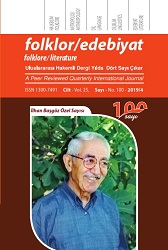Geleneksellik - Gerçeklik İlişkisi Bağlamında Bilginin Niteliği ve Folklorda Yalan Haber - I
Qualification of the Knowledge in the context of the Relationship between Traditionality and Authenticity: Fake News and Folklore – I
Author(s): Mustafa DumanSubject(s): Cultural history, Customs / Folklore, Media studies, Oral history, Theory of Communication
Published by: Uluslararası Kıbrıs Üniversitesi
Keywords: fake news; traditional knowledge; qualification of the knowledge; folklore studies; oral tradition;
Summary/Abstract: Fake news has attracted the attention of scholars from around the world as a new research area in recent years. Especially right after being raised by the US President Donald Trump at a press conference in 2016, fake news has been addressed mainly by the scholars in the field of communication so far. Recently, it has occupied other researchers’ agendas in different parts of the world, and in response, a new awareness has been created about fake news. There are a small number of studies conducted by Western scholars in the field of folklore which are attracting the attention of folklorists in other parts of the world regarding a new field of study which is attempting to determine the terminology and research method for studying fake news. The factors responsible for the efficiency in the emerging and spreading of fake news and the relationship with oral and written culture have been determined as the focal point in this study. Moreover, the effects of oral and written culture on the quality of the knowledge presented in texts claiming to authenticity are analyzed in the context of fake news. Within this scope, the nature of fake news and its relationship with folklore are examined in this study. In addition, the attitude that folklorists should have in examining particular issues related to fake news such as the changes in the knowledge-sharing environment and reproduction of the knowledge are evaluated. Additionally, this study is aiming to introduce the fake news to Turkish scholars, to create a mutual terminology that can be used by them in analyzing fake news and to determine new sub-issues related to fake news.
Journal: Folklor/Edebiyat
- Issue Year: 25/2019
- Issue No: 100
- Page Range: 971-984
- Page Count: 14
- Language: Turkish

